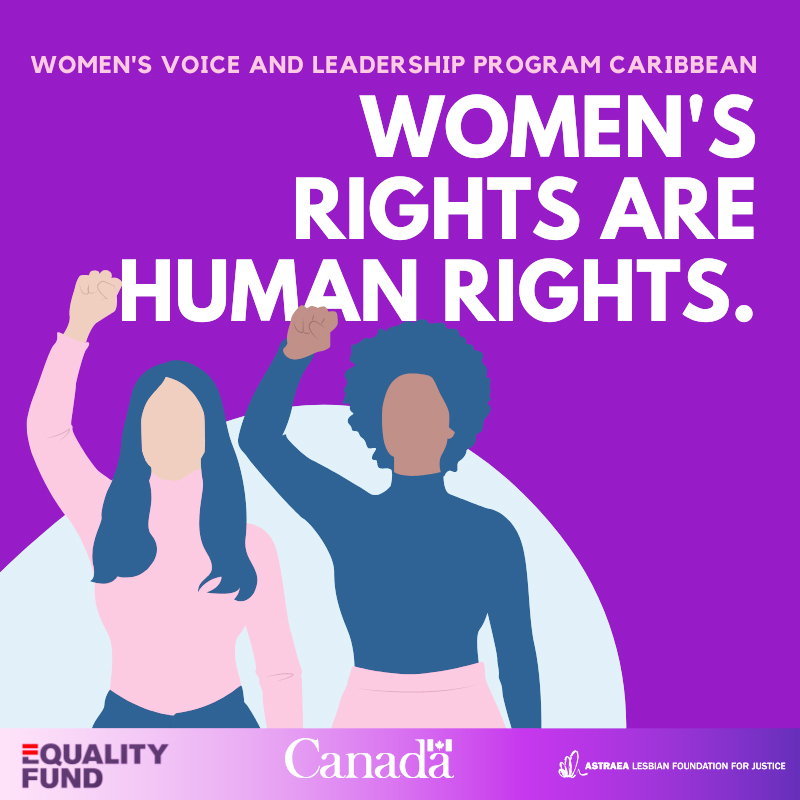Six Guyanese organisations that focus on women and gender and LGBTQ issues are now among the 27 Caribbean beneficiaries of direct funding from the Canadian government’s Women’s Voice and Leadership (WVL) Project.
The six local organisations are the Makushi Research Unit, the Wapishana Women’s Movement, Women’s Wednesdays, Red Thread, the Guyana Rainbow Foundation (GuyBow) and Guyana Trans United.
The project is a part of a CDN $150 million global programme funded by the Canadian government to provide support for local women’s organisations and movements that advance women’s rights.
The launching of the project for the six local organisations and three from Suriname was done virtually last Thursday via Zoom by the High Commission of Canada to Guyana and Suriname in partnership with the Equality Fund and the Astraea Lesbian Foundation for Justice.
The virtual launch also included a panel discussion, held under the theme ‘Gender Justice in the Caribbean – the role of the Women’s Voice and Leadership project’.
What is important about this funding project, which also had virtual launches in other Caribbean countries, is the fact that unlike other funding programmes, it has taken a feminist approach. This means, according to Amina Doherty, the Programme Director of Women’s Voice and Leadership Caribbean, that the project is providing flexible funding that also recognises the challenges that the COVID-19 pandemic has created. “We don’t say to organisations you apply for this, so you absolutely have to do this. We recognise that situations change and, therefore, the funding has to be flexible. We provide core support,” she said.
According to Doherty, the resources provided will help the organisations to pay for their spaces, keep their electricity and pay their staff members, among other things. She pointed out that it is not sustainable for staff to work for free as she emphasised that if one wants to support sustainable movements in the region, funding is necessary.
According to Doherty, whether it is grassroots women organising on the endemic issue of violence against women in the region, or young women courageously daring to break the silence on taboo subjects such as sexuality, sexual health and reproductive rights in the Caribbean public, or indigenous leadership and activists in Guyana, the organisations need support.
Explaining the project, Janine Cocker, Counsellor for Development Cooperation at the High Commission of Canada to Guyana and Suriname, stated that gender equality is a big deal for Canada and therefore it is in everything they do and it is enshrined in their policies, development assistance and diplomacy work.
The WVL project, she said, showcases Canada’s commitment to the issue since it believes the advancement of women and gender equality and the empowerment of women and girls are the most effective ways of reducing poverty, creating lasting peace and achieving sustainable development.
Specifically, providing women’s rights organisations and networks with direct funding to help advance equality is a key strategy. “If we want this kind of transformative change that we have been talking about we need collective leadership and strong organisations, women’s rights and LGBTQ [lesbian, gay, bisexual, transgender and queer or questioning] organisations,” she said while pointing out that over the years women’s rights organisations have been chronically under-funded, which has created a key obstacle in effective programming to advance gender equality.
‘Too long’
Meanwhile, Dr Alissa Trotz, a professor of Caribbean Studies and Director of the Women and Gender Study Programme at the University of Toronto, said that for too long the indigenous voices have been fairly invisible in the women’s movement.
Trotz, who moderated the virtual launch, underscored the emphasis placed by the project on the actual needs of women and LGBTQ organisations as these groups in the Caribbean face a funding landscape that is deeply inadequate and deeply uneven and “comes with all kinds of restrictions”. She said the norm is that organisations have to fill out page after page to apply for funding and the language is so technical and complicated that immediately it raises class issues for women who may not have access to the formal education required to fill out the forms.
Many of the organisations, she noted, end up having to do a lot of volunteer work because there is just no sort of funding for institutional strengthening and capacity.
She commended the approach taken by the new project, which means that the organisations do not have to jump through huge hoops and that institutional strengthening is understood to be part of capacity building and empowerment. The programme has also put in place mentoring, which will see the groups being followed and working together over the next couple of years.
Another focus lauded by Trotz is the move to ensure women are at the centre of decision making, starting with the women who are doing the work.
Well-known rights activist Vanda Radzik, who assisted WVL Caribbean in crafting the project in the region, said that apart from focusing on women’s issues, there is a need to bring a decent understanding of politics back to the lives of the ordinary people. In this regard, she underscored the work of the late political activist Walter Rodney and social, political, and gender rights activist Andaiye.
She noted that WVL becomes important in dimensions because it has not just followed the pattern of corporate development, which she believes is killing development from the inside out. The project, she said, also allows groups that are not even registered to apply and allows people who are always on the outside to have a chance to have their voices heard and their leadership better heard and recognised.










